“Kyousuke is back!” a voice shouts. And then, everyone in the school dorm runs to goof around a senior year student. Kyousuke is the idea guy, the visionary leader, the creative force and the acting big brother of a group of five called the Little Busters, known and loved throughout the school. Soon to graduate, he is looking for a job, and sometimes leaves for an interview here and there.
Among the rest, the timid Riki Naoe, the youngest member, runs there, joyful, but also secretly afraid because next year, Kyousuke will have gone away; what will that mean for the Little Busters, who are his entire world? Things are going to change, and it will hurt. Because some things, as big or small as they may seem to others, really do hurt. And sometimes, they hurt to the point that you barely can, or just cannot, cope with them, and it feels like your world is going to end.
Kyousuke looks tired. He comically falls asleep in the table, and when asked about how he traveled to the city, he quips that he walked walked, in his usual style. He likes to tease and puzzle others to open them to wonder, to change, which reminds me of my relationship with Christ. Then, he comes up with another ridiculous idea, as always, full of fun and wonder. As the story starts, a ridiculous baseball match is set, featuring girls with colorful personalities, making it clear that during Kyousuke’s last days at school, Riki will, one way or another, live out a lot of typical anime adventures, fall in love, and face dire challenges, some of which may even shatter his world. And, as Little Busters is a visual novel, we will return to this first scene in which the exhausted Kyousuke comes back, again and again.

Do you often find yourself thinking that human life is just like a multiple-route visual novel (VN)? Visual novels are a popular type of Japanese interactive written work with illustrations and usually a maze-like structure in which important choices act as bifurcations, carrying the story into all sorts of different directions, first and foremost toward different heroines our quite adaptable hero could end up with? No? It may be just me. Anyway, this is a genre with great potential for meta-narrative and transcendence of the elements of the story, forcing reader to reflect about the meaning of their experiences and thus communicating wisdom, sometimes with striking Christian parallels, as Japesland and Kaze brilliantly explained here some years ago with their respective articles on Key´s Rewrite, another great VN.
While there are precious few all-ages, well-written, multiple-route VNs, Little Busters may be the finest example out there, and is worth the odyssey of confronting a new medium, reading it to the end, putting up with the less perfect aspects, and letting oneself be touched by it. Like Kaze did, I strongly encourage you to skip the anime and experience it the “hard way,” going through the seven routes and the 50+ hours of narrative, and thus receiving the full impact of the Refrain route, the final one, until the schoolyard, the dorms, the classrooms, and the school ground feel like places you know, and the characters become old friends. Well, today I happen to be feeling pretty much like both Riki and Kyousuke, so maybe it´s a good day to dive in the world of Little Busters, for now with minor spoilers. I will make a parallel between my experience and that of Riki, leaving Kyousuke for another article.
To be sincere to this community, I´m suffering, more so than at any other time I remember, for various reasons—some expected, some unexpected. I am blessed with loving family and friends, spiritual help, times of rest, things I enjoy, and a clear view of what I think I should do, and the prayers of many brothers and sisters in the faith. That all helps a lot. Yet, it is hard. And I cannot help but feel there was a time in which my life was not this wild Dostoevsky crossover.

There is also deep suffering beneath the surface of the bright school world of Little Busters and its cheerful video game music. It has many forms, many causes, and marks various characters. Which are, and who is affected, are questions that I will set aside for now. I will say, though, that we soon learn that our protagonist Riki Nagoe, from whose viewpoint we experience the visual novel and whose important choices will determine in its course, was left an orphan at a very young age and fell into utter despair, into a world with no color or meaning. And the Little Busters, and chiefly Kyousuke, saved him from that. Like Christ did in my own life, he was the one who turned him into a member of his precious family, the one who offered his hand to him and said: “Follow me, and I´ll show you something cool.” A sign of life, a new life.
When one is trying to live a life which is coherent with that gift, as Riki does in every route, and suffers strikes, and as they become more intense, it feels—both for Riki and for me—like this experience, this promise, has been an illusion from the beginning. It kind of strangles you, suddenly pierces you, puts your head underwater. Everything shatters. Just as with certain character in Little Busters, God, Christ, may suddenly then feel distant, indifferent, far away, or vague against our very undeniable and immediate suffering, or may even seem to be the cause of it. And then, the natural questions arise: How has it come to this? How I am supposed to deal with it? Can I ever go back? Is it just going to be like this from now on?
I mentioned elements that transcend the narrative. Well, suffering certainly disrupts the narrative aspect of our lives: Like love, it cannot be controlled, let aside or explained away in a way that would allow us to surpass it, solve it and simply leave it behind. Not even by the hope and truth of the faith, something we Christians ought to remember, lest we behave like the friends of Job towards those who are in suffering, and merit the same reproach they did. We will see many good people and things in Little Busters become this kind of obstacle. Answering these questions, even rightly, just doesn’t suffice.
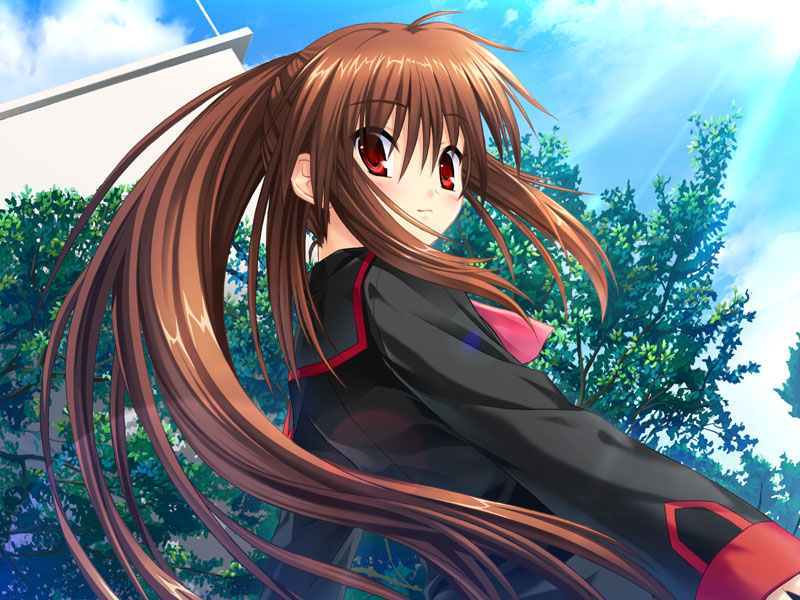
Suffering goes also beyond its specific causes (physical, emotional, psychological), strategies to cope with it (however necessary), or even purposes, which, in a way, cannot account for it. This is because, like death, suffering is specifically linked to the sensory and vital experience of a world of sin, the choice of a world without God or His love, a world in which there is a sort of intimate destruction that transcends time. As Jun Maeda shows us time after time, you may have good reasons to think that you will be happy tomorrow, or even that you are loved, but now you are in suffering, submerged in a feeling of despair, destruction and death, and again, it is a “now” which seems to overpower time and can bring you down.
If love is a sign of hope, suffering eats up that hope, and is primarily a sign of despair for us. And thus, it stands as a sign of contradiction before God and His hopeful promise: That He loves us, and He wants to give us life, and life in abundance. Many of the Psalms and the mysterious book of Job deal with this, but the ultimate word of the Revelation in this matter is the encounter with the suffering God, with the crucified Christ. That encounter is not an explanation. It is something far stranger, far more personal and intimate, and also far greater.
In our suffering world, that encounter has bring consolation and hope to many, including myself. It has even helped some in accepting or even choosing all sorts of terrible, monstrous sufferings so that others may live, truly live. These are the “martyrs,” the witnesses of Christ, choosing love in the midst of suffering, the most powerful signs of hope there are. The crucified Christ is also, directly or indirectly, at the heart of many of the best stories ever written, directly or by way of analogy, from Brothers Karamazov to… Little Busters. Yes, seriously.
As I will be commenting now in the “secret of this world,” there be major spoilers for Little Busters. From now on, I will assume general knowledge of the entire story, and again, it is well worth experiencing in its visual novel form. But first, let not be thought that I am imagining this analogy. Here you are.

So let´s get to it. Why the suffering in this world, including mine right now? Why the cross? Why was Abraham told to sacrifice Isaac? Why is Kyousuke trying to put an end to the Little Busters, as it becomes apparent, leading Riki´s life into chaos? Him, a man obviously capable of sacrificial love, and who has done so much good for each of the Busters? For Riki, it feels like betrayal by the one he trusts the most, an earthquake that affects everything, and doesn’t stop.
Luckily, I haven´t had this emotional experience with Christ, as some good Christians around me have. Even when I suffer, I can feel Him near. The most I can say in this respect is that for me, as for everyone, there are parts of the Scripture that are harder than others to swallow, in general or in specific moments. Sometimes in the words of Our Lord. I have said elsewhere that the quality I admire the most in Him is His loving, unconditional fight to save us, the way He just doesn’t want anybody of His precious family to die, and will do anything to save them.
But then, have you heard the parable of the wise and the foolish virgins? They did not prepare oil for their lamps, as the wise had. They had all fallen asleep. So when the time came, and the Bridegroom entered, they couldn’t join him, and the wise virgins didn’t lend them their oil. They had to go to the store in the night, and when they returned, the doors of the wedding party were closed, and the Bridegroom said: “I do not know you.” And then, there was Hell. And I asked myself, why? They wanted to enter the feast. They were careless, foolish perhaps, but they wanted to repair their error. Had the five virgins been loved friends, why wouldn’t the Bridegroom open the door for them, forgive them, let them share his joy?
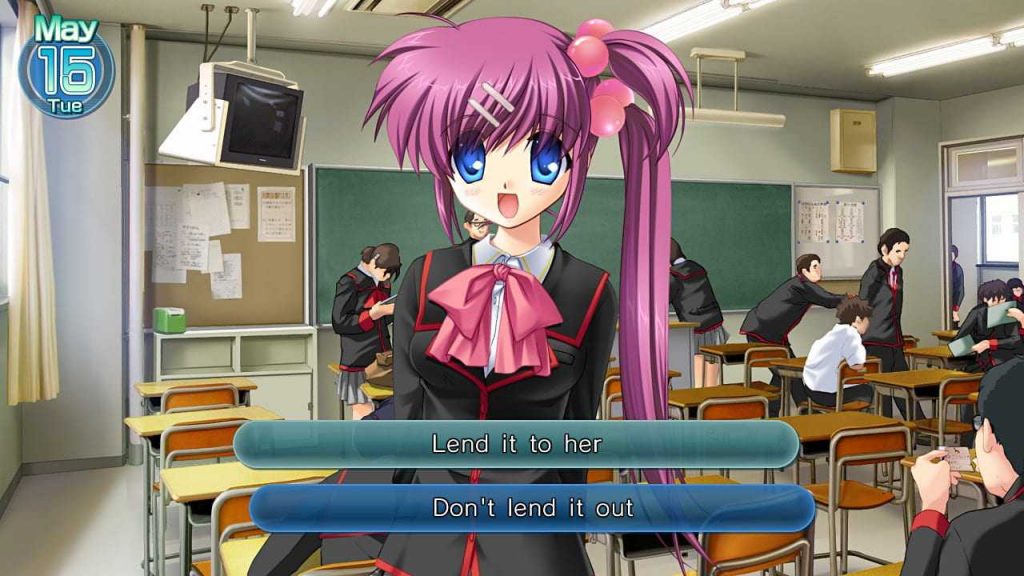
Or there you have the parable of the talents. A man entrusted his treasures to his servants. Two of them were diligent and made a generous profit, while one of them was a coward sloth who buried the talent. But he didn’t even spend it in vices, as the Prodigal Son did, and yet, the Prodigal Son is waited for and forgiven, and the man of the talents is cast away, and his talent given to the one who has ten, “For to everyone who has will more be given, and he will have an abundance. But from the one who has not, even what he has will be taken away.” Why is this?
For a long time, I just shrugged and trusted God´s goodness, as the Disciples were called to do concerning the discourse of the Bread of Life. And then, one day, it came to me. Both parables are warning us: We are in the same situation that Riki Naoe and Rin Natsume were in Little Busters. And what Kyousuke was for them (and much more), Christ is for us.
Because, you see, The world of Little Busters really resets itself after each one of the six stories, leading to the next (this number of iterations is important for me, too), and Kyousuke has only so much time to prepare Riki Naoe and his own sister, Rin Natsume, who will be the only survivors aside from other five girls, to be able keep on living without the rest. Which, dependent and fearful as they are, they are just not able to right now. They are in a very dramatic situation they don´t even know of: Their hearts simply won´t go on living without a painful process of healing and learning, a kind of open-heart surgery. They will flee from life, destroy themselves, and die. And Kyousuke, granted miraculous powers for a little time, is the only surgeon they have, their only hope.
Kyosuke loves Rin and Riki, and the rest. He wants to affirm them, to make them able to be themselves without self-destructing, to heal them, to unite them, to make them able to live. And he needs Riki to become a man capable of freely choosing to wake up and carry Rin out of the bus in flames. He has not caused the wounds, the pain, but he will led them through a sometimes painful path to reach the other side.
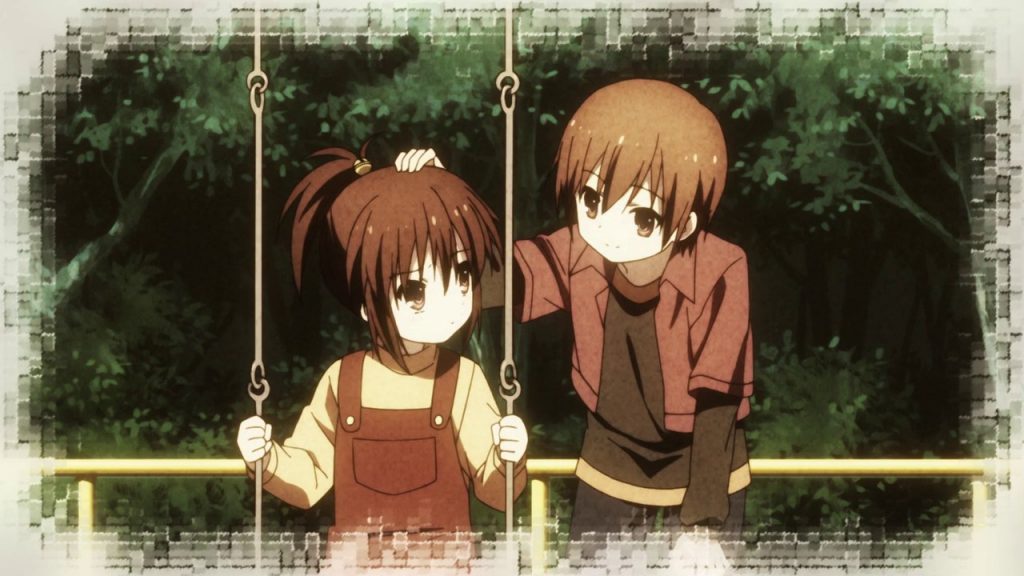
Likewise, the parable of the foolish virgins tells us that we are Riki and Rin, not (just) emotionally, but in a much deeper way which affects our inner beings, of which the experience of pain and death are the sensory manifestations. That there is something important, vital for us, so important that without it we won’t be able to truly live without it, that we do not have and could not achieve by ourselves, but we can have when Christ gives it to us. It is love—His, but intimately ours, if we choose to accept it through faith and hope. It will turn each of us into the person he really is, give each of us his or her true name, create a bond between Him and each of us, unite us with others, and make our soul a place in which God will live. Without it, we are in the dark—dead. The entire world is not worth what this life is worth.
And as the oil was not lent, nobody can accept this gift for us in our place. It has to be us, each one of us. Without truly loving, it would be impossible for us to join God in His glory, not because He closes the gate, but because being openly in front of the loving Truth without loving IS eternal Hell and damnation, and suffering for body and soul. You just cannot enter the wedding without the light: That is what entails the creation of free beings capable of accepting love and loving in turn. Our Lord makes many references to this mystery, but I think it is the Book of Malachi that says it most directly: “And who can stand when he appears? For he is like the refiner’s fire, or like the fuller’s lye.” The same day which will set the “proud and evildoers” on fire, “leaving them neither root nor branch,” is the day of the “sun of justice with its healing rays.” The fire and the sun are the same thing. The difference is in the receiver, and if he or she has been changed from the inside.
And thus, we must be vigilant. Lest we forget about this gift of love, the most important thing in this world, and devote our hearts instead to things, even good things, that are not essential.

And there is limited time, this life, created for us to grow and mature in love before giving the glorious answer that transcends time, after which we will not be able to acquire this love: It can only be accepted in this life. This gift, this path of transformative love for God, others and ourselves, participating in the Love of God as a vitral of the light, is sometimes painful, as it entails accepting to be purified, transformed, and touched at the deepest level. It goes through suffering and death for others. But the pain of coming to love with Christlike love, we trust, will be a salutary pain. Our vitral, our true shape, our true colors, will be clean. As with the grain of wheat, this death will result in the fruit of life. For us, and for others who we will come to love and bring Christ to, for He chooses to act through us sinners.
Komari the princess, Kud the exotic transfer student, Kurugaya the fierce and near-adult, Nishizono the bookworm, Rin the timid, and Haruka the cheerful troublemaker may seem like opposites on the outside, as Masato and Kengo. But they are all under the shadow of tragedy and pain, trapped, in dire need of salvation, which needs to be effected by slowly opening their inner suffering and darkness to the truth and love Kyousuke’s plan will bring them through Riki, small and afraid as he is.
And thus the talents: No matter how little talent you may think you have received, it can and will be fruitful, visibly or invisible, if one is faithful to the gift of Christ and participates of His loving offering. For all which is born from God will defeat the world. If this love is in us, we will also come to love those who Christ, the Crucified, loves. This is the Kingdom of Heaven which has come to us, Christ Himself, alive, in person, united to us. It is also the holy Communion, the Church, the New Covenant, the embrace of the Cross, the Plan of Salvation. The entire Creation awaits it. A plan that does not make suffering disappear, but which gives us a way to unite to Christ to conquer it and offer it up to God, and finally go beyond and thus, live again.
When the final miracle comes, when the Resurrection happens, the reader of Little Busters knows that is just the nature of the life-giving love that the story presents. Some places are only reached by experiencing the path the hard way, and the Resurrection in Christ is one of them. It transforms your life. I can only say that I would not choose a different route.
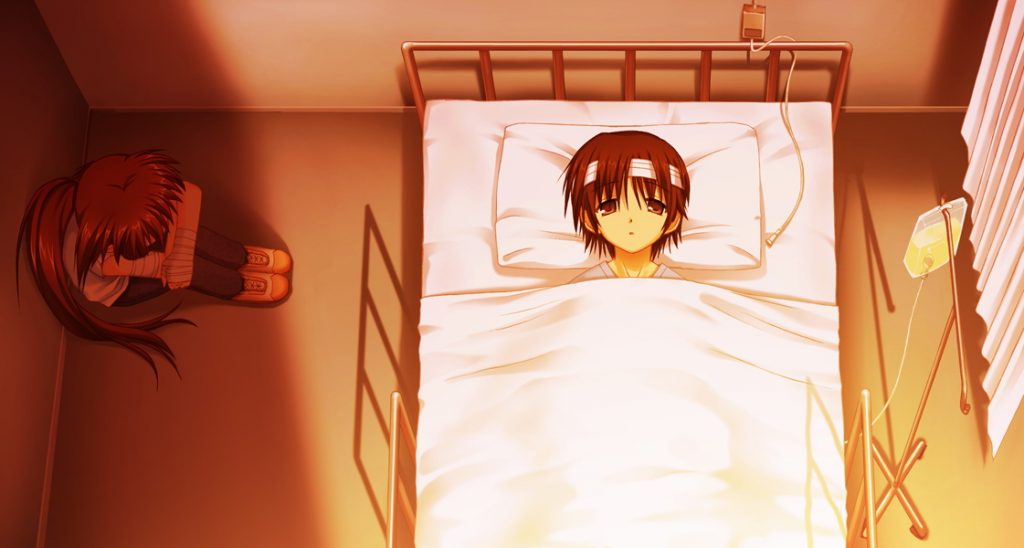
- To Be Hero X: Of Exaltation and Sorrows - 11.12.2025
- First Impression: One Punch Man Season 3 - 10.13.2025
- First Impression: Chitose Is in the Ramune Bottle - 10.07.2025
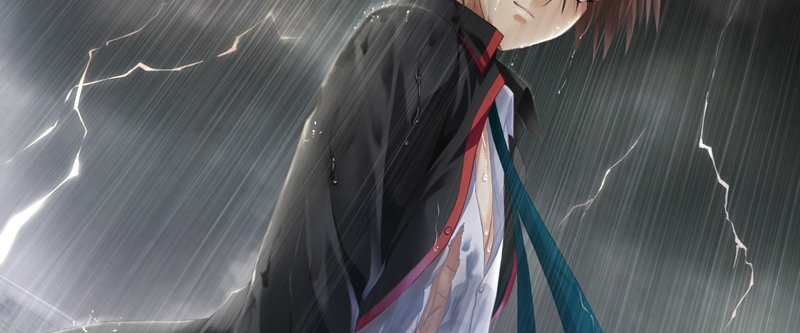

Every time I sit down and read another of your posts, I am grateful you’re writing for BtT. Frankly, I find your posts the most thought-provoking our site has to offer. You always find a way to challenge me, to ask me to think more deeply about my relationship with our Lord. Thank you.
Thank you for your words, Jeskai. You know, in writing this I thought the way in which you shared your own struggles in your “Nice Shoujo Protagonist…” post. BtT has been a blessing for me too: I love this site and its people.
[…] everyone at his or her own pace to bring that person into His plan of salvation. He is more like Kyousuke Natsume. Klaus may still grow, nearer to Him while fully himself. Maybe Cthullu has come and gone, and hope […]
[…] Kingdom of Heaven is the one manifested at the Resurrection. Dying for love will bring back life. Actual, tangible, biological life. The resurrected Christ ate a fish. We will truly be together again, as that summer day on Mitomo […]
[…] Christ. Especially, when our own disconcerting, stomach-churning discourse of the Bread of Life comes. Our disgust is healthy, but we don’t use it to just cut others off from our lives. Or fall […]
[…] Deku, I’m all about homages, so in subsequent articles, I would like to risk talking about the four […]
[…] started out as a Key visual novel, released between the moving Clannad and the likewise powerful Little Busters. If you’re a fan, you might want to check out the series of guest posts James did here back […]